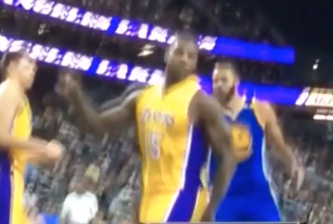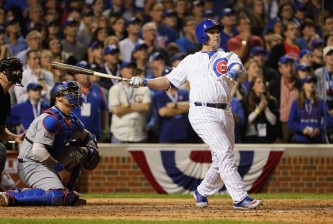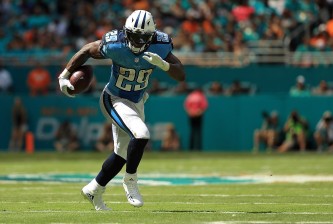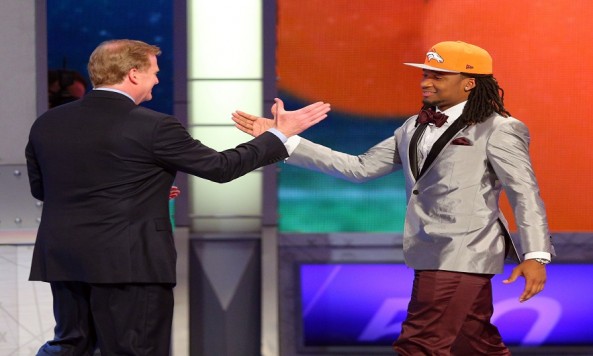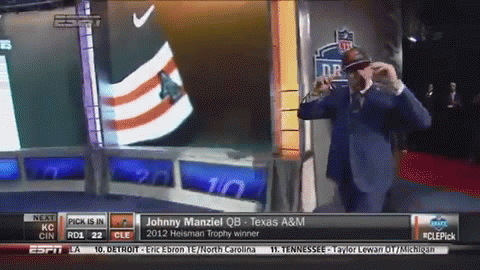The 2014 NFL Draft is in the books and it was certainly an interesting process for everyone involved. From reaches to steals, a number of players were drafted where they shouldn’t have been. And 32 different opinions on NFL hopefuls were on display for three days at Radio City Music Hall. Now that it’s all said and done, it’s time to judge which teams consistently had the most accurate grades on prospects.
As a disclaimer, I just want to say that any type of grading is very subjective. We ranked the NFL teams by the overall strength of their draft class, relative to where they picked and what needs they had. Grading teams relative to the other teams in the league is the most realistic way to judge performance in the draft, as that’s who they’ll be up against during the season.
New York Jets — A+
The Jets put together the best draft of any team in the NFL. New York got fantastic value in the first round with Calvin Pryor and got better from there.
Jace Amaro, a second round pick, is going to flourish in offensive coordinator Marty Mornhinweg’s system. Dakota Dozier, a guard, and Trevor Reilly, a defensive linemen, were big-time steal picks and the Quincy Enunwa selection was one of the draft’s best.
Pittsburgh Steelers — A+
Pick after pick, the Steelers seemed to continually make the right selections. On Thursday night, one might have thought that the Ryan Shazier pick was a reach, but it was really part of a carefully crafted draft plan to become more athletic on the defensive side.
Ben Roethlisberger now has three lethal offensive weapons in his stable now with Dri Archer, Martavis Bryant and Rob Blanchflower, while the defense is lucky to add Stephon Tuitt, Jordan Zumwalt and Daniel McCullers with Shazier.
#Steelers offensive staff loves Martavis Bryant. Not worried about off-field stuff. Think he can be a big producer.
— Alan Robinson (@arobinson_Trib) May 10, 2014
St. Louis Rams — A
The Rams set the tone for a well-done draft with a great first round, adding a quality lineman on each side of the ball (Greg Robinson on offense, Aaron Donald on defense). St. Louis went on to make two big-time Day Two selections with Lamarcus Joyner and Tre Mason, finding two rookies that can contribute right away.
As publicized as the Michael Sam pick was for its far-reaching social implications, it was also great value in the seventh round to find a pass rusher with a big-game pedigree and impressive production.
Jacksonville Jaguars — A
Finally, the Jaguars made a wholehearted commitment to winning. After drafting quarterback-of-the-future Blake Bortles in the first round, Jacksonville got him some weapons named Marqise Lee and Allen Robinson (both of whom were first-round-worthy talents) on Day Two.
Grabbing Aaron Colvin, Telvin Smith and Storm Johnson, three players who are each capable of starting at some point in their careers, on the third day of the selection process will make this draft the kind of turning point that this franchise needed.
Baltimore Ravens — A-
Baltimore’s first two selections each have the potential to become ten-year starters at their respective positions. C.J. Mosley isn’t a complete linebacker, but he’s good enough to help the Ravens be a competitive ballclub as an inside linebacker. Timmy Jernigan is an absolute monster who will control two gaps at the next level.
Later on, Baltimore made a number of other very solid selections, like Keith Wenning and Mike Campanaro. Crockett Gilmore and Terrence Brooks are also players that can make a difference as soon as 2014.
Minnesota Vikings — A-
Anthony Barr has a good skill set but was drafted too early. That said, for Minnesota to come away with Teddy Bridgewater at pick No. 32 makes this draft class among the league’s best. Second round selection Scott Crichton uses his hands well and figures to legitimize the edge for Mike Zimmer’s defense.
The Jerick McKinnon selection is interesting, especially after the Vikings lost Toby Gerhart to the Jaguars this offseason. Lastly, getting David Yankey in the fifth round shouldn’t have happened. He’s a special player who could have gone in the second round.
Coach Mike Zimmer stated after the draft the #Vikings are open to starting No. 32 pick Teddy Bridgewater as a rookie.
— Gridiron Experts (@GridironExperts) May 11, 2014
San Francisco 49ers — B+
Recognize that the 49ers weren’t drafting for 2014 with this class. A number of the players that Trent Baalke, Jim Harbaugh and the Niners’ brass selected likely won’t see the field this season, due to pre-existing injury or lack of a favorable depth chart situation.
That said, the 49ers are so stacked, they have the luxury of doing that. A few years down the road, NFL fans will see just how smart the Brandon Thomas and Keith Reaser picks were. The Chris Borland pick will be able to offset the loss of Navorro Bowman to injury, which is key, and the Jimmie Ward pick helps San Francisco upgrade its secondary corps immediately.
Green Bay Packers — B+
The Packers’ first round selection of HaHa Clinton-Dix may have been a reach, but the team had to take a safety there and likely had Clinton-Dix as the highest player at the position on their board.
What really makes this draft is the value that the Packers got at wide receiver, with Davante Adams, Jared Abbrederis and Jeff Janis all candidates to make a meaningful contribution to the team next year. Past that, linebacker Carl Bradford upgrades the team’s run defense and Demetri Goodson is a solid developmental piece.
Oakland Raiders — B+
The Raiders had an excellent draft in the early going, but didn’t get the kind of value near the end that would constitute a higher grade. The Khalil Mack pick in the first round was fantastic, but getting Derek Carr at No. 35 was even better.
The Gabe Jackson pick wasn’t bad either, as Oakland could use an interior offensive linemen.
In the fourth round, Reggie McKenzie nabbed Keith McGill, a bigger corner that will be a big part of the team’s secondary as soon as next season. Justin Ellis, a defensive tackle, was also a solid get.
New Orleans Saints — B
After the first night, New Orleans had an “A+” after trading up for a lethal offensive weapon in Brandin Cooks. They maintained such a grade with the Stanley Jean-Baptiste pick. That said, New Orleans made a string of poor selections to close out the draft and weren’t able to stay in the “A” range after wasting three picks in a row on very injury-prone defensive players.
The Saints needed a few ‘sure things’ if they wanted to stay in the NFC playoff picture, but weren’t able to acquire such players in the later rounds.
Chip was very complimentary of WR Brandin Cooks. Said he may not have fit measurement parameters but thinks he’s gonna be helluva player.
— Jeff McLane (@Jeff_McLane) May 10, 2014
Buffalo Bills — B
This grade really comes down to how well Sammy Watkins performs over the course of his career in Buffalo. If he develops into a true No. 1 receiver, which he has the potential to do, moving a 2015 No. 1 pick was worth it.
If not, though, this was a bad draft. That said, the Bills addressed a host of needs other than wide receiver, including holes along the offensive line with Cyrus Kouandjio, Cyril Richardson and Seantrel Henderson. In the defensive backfield, Ross Cockrell will be better than a lot of people think. Also, Preston Brown could replace Brandon Spikes as early as 2015.
Houston Texans — B
The Texans made the obvious choice at each one of their picks, but it’s tough to say if they really got that much better after the Jadeveon Clowney pick.
What they need is a quarterback.
Sure, they add a solid guard in Xavier Su’a-Filo and could get help along the defensive line from Louis Nix III if he stays healthy, but Houston’s opening day quarterback still figures to be Ryan Fitzpatrick and the team still has unaddressed needs. Bill O’Brien’s first draft was as decent as it was underwhelming, so a “B” is a fair grade for this team’s ultimate haul.
Tampa Bay Buccaneers — B
The “Dunkaneers” got Josh McCown two big targets in Mike Evans and Austin Seferian-Jenkins, which will help the journeyman quarterback transition from Chicago to Tampa Bay. However, the team had a number of other needs (especially on the defensive side of the ball) that got no attention.
In his first draft with the Buccaneers, head coach Lovie Smith, a defensive minded guy, came away with no defensive players. There are things inherently wrong with such a development.
Cleveland Browns — B-
All of the good occurred on the first night of the draft for this team. After landing the draft’s best cornerback, Justin Gilbert, and picking up an extra first round pick in 2015 in the process, Cleveland was still able to nab quarterback Johnny Manziel in the hopes of re-energizing its fan base.
Unfortunately, over the next two days, the Browns didn’t pull the trigger on a wide receiver capable of being Manziel’s top target and it looks like Johnny Football will suffer through his rookie season throwing to a group of below-average pass catchers.
Denver Broncos — B-
Last year’s AFC Champion had a solid start to the draft, but didn’t have enough picks to do anything terribly earthshaking. The Cody Latimer pick was a smart move, replenishing Peyton Manning’s stable of receivers. The Bradley Roby pick helps Denver continue to compete in the secondary, which will be vital next year.
Michael Schofield could develop into a starting tackle, but he’s not a complete player yet. It remains to be seen how this draft bodes for John Elway’s ballclub, for a lot of the players they took are very projectable. Despite getting a decent player in Lamin Barrow, Denver did a poor job on Day Three, so their final grade suffers.
Detroit Lions — B-
The Lions have glaring holes in the secondary. It’s bad. However, Detroit took Eric Ebron and Kyle Van Noy with their first two picks, failing to upgrade a very poor unit.
Ebron and Van Noy are both very good players and the Caraun Reid pick in the fifth round was a true steal, but without a cornerback until the fourth round and no safety at all in this class, it’s impossible to give the Lions much higher than a “B-”. That said, with Ebron and T.J. Jones in the fold, Matthew Stafford really has no excuse not to perform at a high level in 2014 and beyond.
Ezekiel Ansah & Kyle Van Noy were teammates at BYU. They are now teammates for the Detroit Lions. Detroit selects Van Noy. #NFLDraft2014
— Stephen M. Smith (@ESPN_Future) May 9, 2014
Chicago Bears — C+
An interesting draft class highlighted by a few value picks in the middle rounds, the Bears’ draft class really doesn’t stand out. Kyle Fuller gets roasted on double moves and looks awkward when breaking up passes. He wasn’t worthy of the 14th overall pick despite the fact that it was well-known how much the Bears liked him.
Will Sutton is flawed but talented and Ka’Deem Carey will make the most of his touches, so this wasn’t a completely failed draft. But the team’s ultimate takeaway is unimpressive.
Philadelphia Eagles — C+
Chip Kelly reached all the way down the board for Louisville pass rusher Marcus Smith in the first round, which was a headscratcher for many. While Philadelphia went with receivers back-to-back in the second round, adding Vanderbilt’s Jordan Matthews and Oregon’s Josh Huff with consecutive picks was fine. The team’s only good Day 3 pick was Stanford safety Ed Reynolds.
It’s tough get past the Marcus Smith pick and for that, the Eagles can’t come away with a great grade.
My initial thoughts on Marcus Smith: Reach (rated 79th on my board); Could’ve got him R2; Ceiling: Jabaal Sheard/Floor: Chris Gocong #Eagles
— Chris Steuber (@ChrisSteuber) May 9, 2014
Kansas City Chiefs — C+
The Chiefs had a “fun” draft, grabbing a number of well-known college players. But that isn’t how this process is won. Sure, people know DeAnthony Thomas and Aaron Murray, but the Chiefs needed a No. 2 receiver and some help along the offensive line, which they didn’t really get.
Picking Dee Ford in the first round was another move that made little sense. While Ford was a Top 10 talent, he doesn’t immediately slot in anywhere on a team that is a starting piece or two away from Super Bowl contention.
Arizona Cardinals — C
The Cardinals had a well-thought out plan but failed to properly execute it. The team absolutely wanted to get more athletic and physical (who doesn’t?), but ended up picking the wrong players at different points.
First, the Deone Bucannon selection in the first round seemed like a panicked selection after HaHa Clinton-Dix went off the board. Troy Niklas is a very inconsistent pass catcher and it’s tough to discern exactly what Arizona will get out of Logan Thomas. The Cardinals won’t be able to keep up with the likes of San Francisco and Seattle (and possibly even St. Louis) after such a ho-hum draft.
Carolina Panthers — C
Some will criticize the Kelvin Benjamin pick, but it amounts to a necessary selection. Giving Cam Newton a big receiver with a large catch radius can only be a positive thing and the Panthers needed to take a true No. 1 in the first round.
After that, Kony Ealy was a great value selection in Round Two, but the Panthers took in a lot of inexperienced players that won’t be ready right away. Carolina is now a playoff ballclub. They don’t have time to play draftees that need to develop on the job. Also, for a team that just lost its starting left tackle, not addressing the position at all is a problem.
Atlanta Falcons — C
The Falcons’ draft was going well until the team reached for safety Dezmen Southward in the third round. Things went downhill from there, as the team only scored one true value selection with Yawin Smallwood in the seventh round.
First-round selection Jake Matthews will be solid, but Taylor Lewan would have been a better fit for the nasty attitude the Falcons are trying to develop in-house. With a below-average draft, Atlanta was unable to convince people that they’re ready to return to the top of the NFC South, let alone the conference as a whole.
New England Patriots — C
Really, the only great picks for New England were the team’s first and last ones. Dominique Easley was one of the 32 best players in this year’s draft, filling a need for the Patriots while providing great value. Jeremy Gallon, the team’s final selection, was a steal.
That said, Bill Belichick overdrafted Jimmy Garoppolo with a number of better quarterbacks still on the board, and it’s hard to give a team a great grade when they wasted a second-round pick on a big-time reach. New England didn’t add any players past Easley that will improve their team in Tom Brady’s final years, which is disappointing.
San Diego Chargers — C-
It was clear that, on multiple instances, the Chargers missed out on getting “their guy”. First it was Darqueze Dennard in the first round. Then it was some combination of DeMarcus Lawrence and Kyle Van Noy in the second round. After a while, settling for the “second guy” on the board results in a poor draft class.
It’s not that San Diego came away with a bad class, as they ended up addressing all of their needs. It was just very evident that the team reached for players on more than one occasion.
Cincinnati Bengals — C-
Before the Bengals get torn apart here, it’s only fair to acknowledge the solid AJ McCarron pick. Good for Cincinnati. McCarron’s a fine signal caller capable of leading any team.
Darqueze Dennard and Jeremy Hill’s stocks were inflated throughout the draft process and it ended up being the Bengals who bit the bullet on both. Cincinnati had trouble securing instant impact performers and will struggle to make the leap from first-round loser in the playoffs to Super Bowl contenders without any significant improvements.
I hate “draft grades” as they’re irrelevant for 2-3 years, but I was most disappointed in #Bengals draft. Maybe 2 starters in Dennard/Bodine
— Benjamin Allbright (@AllbrightNFL) May 11, 2014
Dallas Cowboys — C-
The Cowboys had a lot of needs going into the draft and relied too much on the strength of the seventh round to fill said needs. Jerry Jones getting Demarcus Lawrence in the second round was a decent move, but felt he got fleeced, giving up a valuable third rounder (with which he could have drafted a solid contributor) to move up 13 slots.
Zack Martin was a good enough pick in the first round, but the reason the Cowboys are this low is because they had so many different opportunities to drastically improve the squad and they didn’t.
New York Giants — D+
After the Odell Beckham, Jr., pick on the first night, it looked like the Giants were going to have a pretty solid draft. Then, Jerry Reese ruined everything. New York tried to draft quality men instead of quality football players, opting for former team captains over former collegiate superstars on a number of occasions.
While assembling a stable of solid citizens to balance the locker room has its place, the Giants overdid it. Is third-round pick Jay Bromley even going to see the field? Can Andre Williams be nearly as productive in the NFL as he was at Boston College? There are too many questions and too few answers.
Jay Bromley says he was in a grocery store when he got the call he was drafted by the Giants. Thought the scout on the line was lying.
— Paul Schwartz (@NYPost_Schwartz) May 10, 2014
Indianapolis Colts — D+
First of all, the Jack Mewhort pick was terrible. He has bad feet and he’s a poor pass blocker. Mewhort will get abused by speed rushers at the next level, especially playing the likes of Jadeveon Clowney and J.J. Watt twice a year.
With only four other picks and none of them first rounders (Mewhort also wasn’t a Day One pick, hearing his name called in the second round), the only reason this draft wasn’t a complete failure was because the Colts managed to get Donte Moncrief on Day Two. The fact that this team’s first rounder was traded for Trent Richardson also factored into this grade in a very negative way.
Washington Redskins — D
This is a transitional year for the Redskins, what with a new head coach and something of a “prove it” season for Robert Griffin III. In a draft that could have seen Jay Gruden build a formidable defense and trade Kirk Cousins for a meaningful selection, Washington ended up bolstering positions that were already strong while ignoring glaring weaknesses.
The NFC East, as a whole, had a terrible draft. And the Redskins are lucky that their divisional rivals also had a poor three days.
Tennessee Titans — D
After losing Alterraun Verner to free agency, the Titans came into the draft knowing that they’d need to find a starting-caliber cornerback if they were to slow down Andrew Luck and the Colts’ passing game. Just kidding, they didn’t.
Tennessee instead drafted a left tackle with their first pick, then proceeded to overdraft Bishop Sankey and pick three very inconsistent defensive players (none of which were corners, mind you). Despite their poor grade here, getting Zach Mettenberger late in the draft was a good find. He’s a better quarterback than his draft slot indicates and it wouldn’t be a surprise if he took snaps for Ken Whisenhunt’s team before the end of the season.
Miami Dolphins — F
I assigned two failing grades and the Dolphins got one of them. This team’s drafting strategy just screamed desperation. After such a trying offseason, it was important for the team to replenish its roster with talented, young players. But that didn’t come to pass.
Miami reached for Ja’Wuan James in the first round and Jarvis Landry in the second, which just showcases how unprepared the team was for this year’s selection process. It’s unfortunate, because Ryan Tannehill is developing into one of the league’s better quarterbacks and could lead a talented Dolphins team far in the playoffs.
Seattle Seahawks — F
Just because a team has won in the past, it doesn’t necessarily mean that they “know what they’re doing”. Pete Carroll and John Schneider are smart football men, but they just had a terrible draft. Paul Richardson should not have gone as high as he did and there were plenty of other, better receivers available with the pick.
Missouri offensive lineman Justin Britt had no business going in the second round and I wasn’t at all impressed by any of Seattle’s last five selections. Seattle will continue to be one of the league’s best teams, but not thanks to this class.
Seahawks draft OT/OG Justin Britt. Again, that’s two rounds too early. I didn’t have him in my Top 150. Nice player, but bad value.
— Shane Alexander (@A1Gsports) May 10, 2014




















